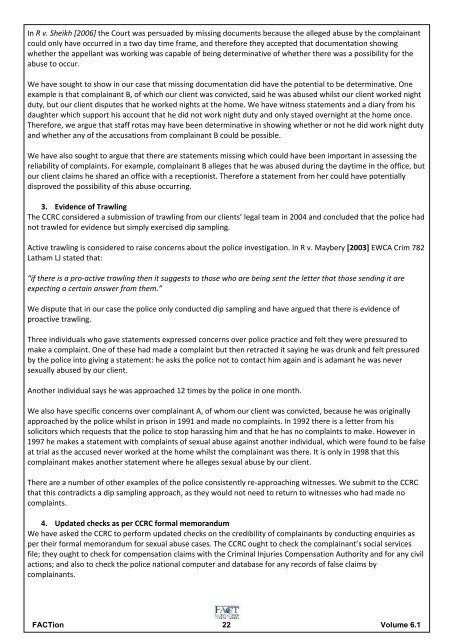FACTion-6.1-web-version
FACTion-6.1-web-version
FACTion-6.1-web-version
Create successful ePaper yourself
Turn your PDF publications into a flip-book with our unique Google optimized e-Paper software.
In R v. Sheikh [2006] the Court was persuaded by missing documents because the alleged abuse by the complainantcould only have occurred in a two day time frame, and therefore they accepted that documentation showingwhether the appellant was working was capable of being determinative of whether there was a possibility for theabuse to occur.We have sought to show in our case that missing documentation did have the potential to be determinative. Oneexample is that complainant B, of which our client was convicted, said he was abused whilst our client worked nightduty, but our client disputes that he worked nights at the home. We have witness statements and a diary from hisdaughter which support his account that he did not work night duty and only stayed overnight at the home once.Therefore, we argue that staff rotas may have been determinative in showing whether or not he did work night dutyand whether any of the accusations from complainant B could be possible.We have also sought to argue that there are statements missing which could have been important in assessing thereliability of complaints. For example, complainant B alleges that he was abused during the daytime in the office, butour client claims he shared an office with a receptionist. Therefore a statement from her could have potentiallydisproved the possibility of this abuse occurring.3. Evidence of TrawlingThe CCRC considered a submission of trawling from our clients’ legal team in 2004 and concluded that the police hadnot trawled for evidence but simply exercised dip sampling.Active trawling is considered to raise concerns about the police investigation. In R v. Maybery [2003] EWCA Crim 782Latham LJ stated that:“if there is a pro-active trawling then it suggests to those who are being sent the letter that those sending it areexpecting a certain answer from them.”We dispute that in our case the police only conducted dip sampling and have argued that there is evidence ofproactive trawling.Three individuals who gave statements expressed concerns over police practice and felt they were pressured tomake a complaint. One of these had made a complaint but then retracted it saying he was drunk and felt pressuredby the police into giving a statement: he asks the police not to contact him again and is adamant he was neversexually abused by our client.Another individual says he was approached 12 times by the police in one month.We also have specific concerns over complainant A, of whom our client was convicted, because he was originallyapproached by the police whilst in prison in 1991 and made no complaints. In 1992 there is a letter from hissolicitors which requests that the police to stop harassing him and that he has no complaints to make. However in1997 he makes a statement with complaints of sexual abuse against another individual, which were found to be falseat trial as the accused never worked at the home whilst the complainant was there. It is only in 1998 that thiscomplainant makes another statement where he alleges sexual abuse by our client.There are a number of other examples of the police consistently re-approaching witnesses. We submit to the CCRCthat this contradicts a dip sampling approach, as they would not need to return to witnesses who had made nocomplaints.4. Updated checks as per CCRC formal memorandumWe have asked the CCRC to perform updated checks on the credibility of complainants by conducting enquiries asper their formal memorandum for sexual abuse cases. The CCRC ought to check the complainant’s social servicesfile; they ought to check for compensation claims with the Criminal Injuries Compensation Authority and for any civilactions; and also to check the police national computer and database for any records of false claims bycomplainants.<strong>FACTion</strong> 22 Volume <strong>6.1</strong>


